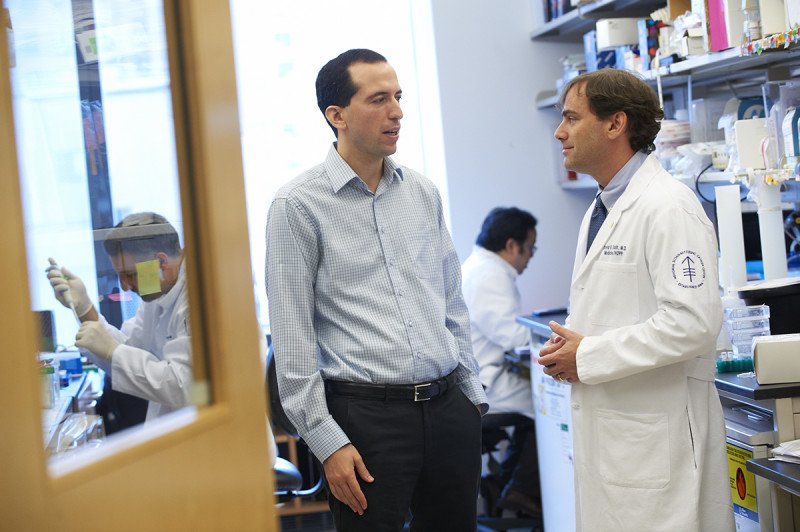
MSK investigators Michael Berger (left) and David Solit.
For people with advanced breast cancer, several clinical trials have shown that experimental targeted drugs called PI3K inhibitors can temporarily halt the spread of disease. But eventually the tumors learn to outwit the drugs and begin growing again.
Now a team of researchers from Memorial Sloan Kettering and elsewhere has gained new insights into how tumors develop resistance to these drugs. The findings suggest that adding additional drugs to the treatment regimen may provide a longer-lasting response and a greater benefit to patients.
“These targeted drugs are already achieving an unprecedented response in patients with metastatic disease who have stopped responding to chemotherapy and hormone therapy,” says Maurizio Scaltriti, a cancer biologist who is co-director of the laboratory of MSK Physician-in-Chief José Baselga and senior author of a study published today in Nature. “Now that we understand how resistance evolves in breast tumors, we can propose new therapeutic strategies for these patients.”
A Comprehensive, In-Depth Analysis
Ongoing efforts to sequence tumors’ genomes are providing a previously unimaginable level of detail about how cancers develop.
In the current study, the investigators began by analyzing 14 metastatic tumors from a single patient who had recently died from breast cancer. The patient’s cancer initially tested positive for mutations in a gene called PIK3CA. Based on that result, she enrolled in a clinical trial testing the drug BYL719, a PI3K inhibitor, which successfully controlled her cancer for many months. Eventually, however, the drug stopped working, and she died.
Soon after, all of the patient’s tumors were analyzed using a technology developed at MSK called MSK-IMPACTTM, which enables investigators to look at hundreds of genes and to collect an enormous amount of information about each of them. One of the lead developers of the technology, MSK genomics researcher Michael Berger, was a co-author on the Nature study.
Deciphering Cause
The team determined that the tumors had developed six different mutations that led to drug resistance. But the result of all these mutations was the same: The tumors had lost the ability to express a protein called PTEN.
“This process is called convergent evolution, meaning that tumors found different ways to arrive at the same result,” Dr. Scaltriti explains. “Tumor cells located far from each other in the body evolve similarly, probably because these mutations offer them an advantage to continue growing in response to the drug.”
In the second part of the study, the team used cell lines to confirm that the loss of PTEN expression was in fact the mechanism by which resistance developed.
The team also implanted a tissue sample from one of the patient’s metastatic tumors into mice so they could study in the animals how the tumors responded to a PI3K inhibitor. They confirmed that the tumors stopped responding to the drug as soon as PTEN was lost.
Foiling Drug Resistance
The findings suggest a new approach for combating drug resistance by taking advantage of the fact that not all PI3K inhibitors work using the same mechanism.
There are actually several different versions of the PI3K protein, which are known as isoforms. In solid tumors such as breast cancer, the two most common isoforms are called alpha and beta. The drug BYL719, which the study patient took as part of clinical trial, targets only the alpha isoform. Earlier studies had found that tumors with lower levels of PTEN relied more on the beta isoform for growth. This led to the hypothesis that tumors are able to start growing again once they lose PTEN if the beta isoform is also not blocked.
“We hypothesize that blocking both PI3K alpha and beta isoforms in patients who have developed resistance to specific PI3K alpha inhibitors due to loss of PTEN could achieve a good tumor response. And we already showed that this was the case in mice,” Dr. Scaltriti says. “The good news is that both alpha and beta inhibitors are already being tested in clinical trials, so it is feasible to design a study that combines the two.”
In addition, he says, checking for the loss of PTEN in patients who have become resistant to PI3K inhibitors would be relatively straightforward. “We want to get the word out there so that other hospitals can begin looking for this and determining whether drug resistance to this class of agents is caused by loss of PTEN or for other reasons,” he notes. “Here at MSK we’ve already started doing so.”
Other co-authors of the study include Dr. Baselga and Scott Lowe, Cancer Biology and Genetics Program Chair in the Sloan Kettering Institute. Investigators from Massachusetts General Hospital in Boston and Washington University School of Medicine in St. Louis also made important contributions to the research.


